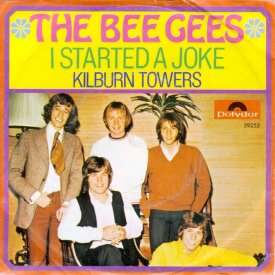Mary Lee Foote analyzed the Robin Gibb song I Started A Joke some time ago, and offered to share it with some of her fellow Bee Gees fans. Because it was rather long she was reluctant to post it on any mailing list. I thought it was most interesting and offered to post it on her behalf on my website. Mary Lee and I hope you enjoy it.

Though this song is considered old in musical reference, it still springs new to the masses who perpetually discover and rediscover the talents of the Bee Gees. Even those of us who have been fans for the span of a generation find new meaning in old lyrics as life carries us into dimensions we have never before explored.
Often seen as a spiritual commentary on Robin's part, he has never claimed that to be the basis of the piece, as such. Experience draws us all in a diversity of directions, often all at once, and inspiration is the trickle-down of that overload.
I am not one to climb into the great minds of our times and autopsy their brainchild of work but I have an awareness of something woven into the lyric here that I've never before seen discussed. The piece encompasses only eight lines of poetic statement, clean and straight-forward in appearance and delivery, yet steeped in the mystery of a thousand ages. This song leaves naked, parts of the soul we tend to keep covered, even from our own deeper selves.
We see in it, our own personal sins of omission that do not look so pretty in black and white and are even more haunting when presented in a package of understated music and single-voiced verse. Although I do see where the spiritual intonation peers through the lyric at us, I see here, too, the personal commentary of an inner moral dilemma being posed by the subject and the step by step process by which he rationalizes his justification for not following his inner personal voice. This person wants desperately to shed his etiquetted skin and stand on the purity of truth rather than cower in civilized silence in the face of injustice.
He theorizes the consequences of such an action on his part. He knows his statement will upset the world that, up to this point, was living comfortably in its own shallow self-deception. Because his view is so different from everyone else, he knows this will upset the sedate tranquility of those around him. In defensive retaliation, rather than re-examining, reforming, and admitting to the error of their ways, society would turn its collective, disdainful back on his statement and proclaim the fundamental truth he has exposed to be merely the folly of a prankster.
He goes on to see that he will not be taken seriously and cries in the frustration of being the only one who has had this vision of truth and reality. He feels alone and small in the cosmos. At this, he knows the world will take great delight in his outward appearance of weakness and defeat and in their arrogance he knows they will unite in crushing declamation and mercilessly taunt him wherever he goes, all the days of his life.
He looks up, seeking heavenly approval and resolve of the issue. He attempts to clear his eyes searching for a sign of the miraculous awakening of those around him. Just as he begins to dry his eyes in the faith that, because of his sincerity of heart, there will surely now be change, he tumbles out of his dream-state into reality. He falls hard from grace back into the moment.
The enormity of the entire situation crashes over him like a tidal wave as he sees the ramifications of what he has started by his simple statement of truth. He is paralyzed in thought and can no longer make sense of his own words as they drown in the whirlpool of confusion between human emotion and soulful truth. He eventually dies a broken man because he knows the truth but never pursued it to the fullest of its intent due to his lack of courage in his own personal convictions. He saw himself as wholly inadequate to challenge what he did not approve of in this world so he never stood up for what he believed in.
After his death, civilization perpetuates itself in its blithe ignorance, unscathed by the voice of truth he held within. He is gone, and with him, the potential threat he posed to a thinly-skinned euphoric society.
In the end, he sees that he had indeed been right and that society was truly wrong. He knows then, all too late, that he would have made a difference if only he had not given in to his own imagined fears.
He wasted a lifetime repressing himself and the truth he had once envisioned. He had become his own worst enemy. He had shackled his own soul down - not the society that he had tried to hold accountable for his lack of action. He ultimately became the very thing he once morally raged against - a silent, self-deceiving member of a pretentious urbane society.
Yes, the joke WAS on him.